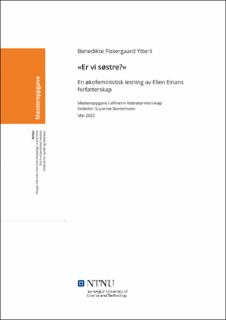| dc.contributor.advisor | Bordemann, Suzanne | |
| dc.contributor.author | Ytterli, Benedikte Fiskergaard | |
| dc.date.accessioned | 2022-07-08T17:20:48Z | |
| dc.date.available | 2022-07-08T17:20:48Z | |
| dc.date.issued | 2022 | |
| dc.identifier | no.ntnu:inspera:107181441:20964200 | |
| dc.identifier.uri | https://hdl.handle.net/11250/3004186 | |
| dc.description.abstract | I Ellen Einans dikt «Hos søster Ku» er det et menneskelig lyrisk Jeg som stiller spørsmålet «Er vi søstre?» til kua som hun ser på beitet. Jeget ser en del av seg selv i denne kua, som står der alene, forsømt og kun blir verdsatt i den grad hun har monetær verdi for bonden. På denne måten betoner spørsmålet sitert i oppgavens tittel den økofeministiske tendensen, som skal undersøkes nærmere. Gjennom en økofeministisk lesning av Einans forfatterskap, viser oppgaven at natur og femininitet henger tett sammen i diktene. Hélène Cixous’ écriture féminine, feminin skrift, brukes for å beskrive den grenseoverskridende relasjonen mellom diktenes ulike subjekt. I oppløsningen av selvet får både dyr og natur taleevne. Denne nære identifikasjonen med dyr og landskap er det som avler slektskap mellom såkalt ‘ikke-menneskelig’ og ‘menneskelig’ natur. Dette familiære båndet fordrer solidaritet, empati og ansvarlighet overfor den Andre, som her innebærer både kvinner, barn, dyr og naturen for øvrig. | |
| dc.description.abstract | In Ellen Einan’s poem «Hos søster Ku» [With sister Cow] a human speaker asks the question «Er vi søstre?» [Are we sisters?] to a cow standing in the pastures. The speaker sees a part of herself in this cow, as she stands there alone, neglected, and only appreciated to the extent that she is of monetary value for the farmer. The question cited in the thesis title thus encompasses the ecofeminist tendency, which the following seeks to examine. Through an ecofeminist approach to Einan’s writing, the thesis shows the close correlation between nature and femininity in the poems. Hélène Cixous’ écriture feminine, feminine writing, is used to describe the unlimited relation between the poems’ different speakers. In dissolving the self, both animals and nature are given the ability to speak. It is the close identification with animals and landscape that creates kinship between so-called ‘non-human’ and ‘human’ nature. This familiar bond demands solidarity, empathy, and responsibility towards the Other, which here includes both women, children, animals, and nature in general. | |
| dc.language | nob | |
| dc.publisher | NTNU | |
| dc.title | «Er vi søstre?»: En økofeministisk lesning av Ellen Einans forfatterskap | |
| dc.type | Master thesis | |
